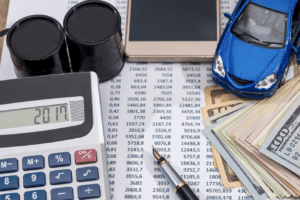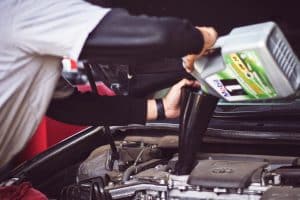Buying a used car can feel like diving into the deep end—exciting, but a little intimidating if you don’t know what to look for. Whether you’re hunting for your first ride, upgrading on a budget, or just looking for something reliable without the hefty price tag of a new car, this used car buying guide has got you covered. From spotting hidden issues to negotiating like a pro, we share all the tips and tricks you need to score the best deal on your next set of wheels!
6 Expert Tips to Buy a Used Car in Quebec
1. Determine your car budget
Before you even start shopping for a used car in Quebec on Kijiji Auto and AutoHebdo, we will define your budget.
At CarInspect, when shopping for your car, we advise you to divide your overall budget in two:
- Your purchasing budget (i.e. the amount you will spend on the day you buy your car).
- Your annual budget (maintenance costs, registration costs, fuel, etc.).
I can’t tell you the number of people around me who bought a car “within their budget” and had to sell it a few months later because they didn’t consider the annual fee when purchasing.
The idea is to be smart about your vehicle purchase. Spending $500 more on a second-hand vehicle won’t necessarily get you a better car. Conversely, a good deal at $300 more than your initial budget might save you money by buying it at the right time and selling it for more a few years later.
Don’t believe me? 🤔
5 years ago, I drove a 2005 Honda Civic with 190,000 kilometers purchased for $1,800.
After several car changes, I now drive a $30,000 car without increasing my initial automobile budget.
For this, I did not have to tinker with the car, nor the mechanics, nor the aesthetics, I followed the recommended maintenance and analyzed the market! Buying and selling at the right time can help you pay for at least your insurance, fuel, and more. But in short, once again, it all depends on your priorities. We will start by listing the different expenses not to forget because the purchase price of a car is far from being the final price 🔖
Costs:
Purchasing budget:
- Sale price (price displayed on the ad)
- Taxes (9.975% if you buy from a private or 14.975% from a dealership)
- Mechanical inspection
- Immediate repairs (if applicable)
Day-to-day car budget :
- Permit fees (approximately $70 taxes included)
- Registration (around $205, in 2021)
- Car insurance
- Required equipment (tires, mats, etc.)
- Fuel
- Extended warranty (optional)
🙅♂️ Warning alert
Please note that adding administrative fees, transport costs or other additional costs not included in the display price of the ad is strictly illegal, and it is a common practice among dealers! This article tells you more about illegal processes if you want to know more.
2. Determine your needs
Rent or buy a car?
Rent
The decision to buy or rent is yours; there is no right answer. Renting allows you to drive a recent car without worrying about mechanical or functional breakdowns. Unfortunately, that peace of mind fades when you must return the vehicle, as the cost of even minor cosmetic defects can quickly add up. That’s why many people purchase additional insurance to avoid this hassle. Therefore renting will often cost you more than buying in the long run.
Buy
When deciding whether to buy a car with cash or through financing options, remember that the idea of a discounted price for cash purchases is often a myth. Dealerships typically upcharge the sticker price of cars for sale, meaning the so-called “discount” for paying in cash is merely the fair price of the vehicle. Financing can offer more flexibility in the buying process, spreading out finances without affecting the actual price.
🙅♂️ Warning alert!
NEVER apply for financing at a dealership!
Suppose the dealers offer to deal with financing options for you. In that case, it is because they take the opportunity to add their commission before sending you the final rate. The rate communicated by the dealership is NEVER the rate obtained at the bank. So, you could take the steps yourself to get the best rate and choose to shop in a dealership or at a private.
Once again, there is no one solution better than the other. It all depends on your situation, cash flow, debt ratio and time. Financing from the dealer might be a good option if you want to save time.
Buy from a dealership or a private seller?
When deciding between buying from a dealership or a private seller, consider your priorities for purchasing a used vehicle. Dealerships often offer warranties or certified pre-owned options, while private sales might present lower prices. Each option has distinct benefits and potential risks, affecting your overall buying experience.
So, who can you buy a used car from in Quebec?
In Quebec, you can buy a used car from any seller, including dealerships or private parties. However, it’s crucial to conduct thorough research on the vehicle’s condition and history before finalizing your purchase. Ordering a pre-purchase inspection from CarInspect is essential for uncovering hidden defects and ensuring protection against unexpected issues. Additionally, reviewing the vehicle history report through CARFAX can reveal crucial details about accident history and property damage. A comprehensive inspection helps ensure the car’s reliability and value.
🙅♂️ Tip! Never buy financial products (guarantee, financing, insurance of any kind, etc.) during the first visit.
“Promotions of the day” in dealerships exist every day… Because once you request financing in a dealership, you won’t be able to shop elsewhere!
Usage & preferences
Ask yourself questions about the desired use of your future car, which will not only help you decide the type of vehicle you need but can also help you identify the features you need the vehicle to have and the condition it needs to be in:
- Is it for city trips or mainly on the highway?
- Do you plan to use it every day or only on weekends?
- Will you need to use it as a personal or commercial vehicle?
- What are your priorities: comfort, reliability, driving pleasure, advanced safety features, or low fuel consumption?
Types of fuels
Gasoline
Gasoline is the most common fuel, available in various grades from regular to premium. Higher grades are typically required for vehicles with high engine performance or sporty designs. While gasoline engines generally offer good fuel economy and fuel efficiency, the costs can be higher for premium fuel. Opting for a gas engine is ideal for those who value excellent fuel economy and smooth engine performance.
Diesel
Diesel fuel is ideal for long journeys, providing durability and a longer engine lifespan compared to gasoline engines. Though diesel vehicles are less fuel-efficient and not recommended for short trips under 10 km, they are a smart choice for drivers covering 20,000 km or more annually. Proper maintenance, including regular checks on engine belts, ensures that diesel engines perform optimally over time.
Electric ⚡
Electric vehicles are an excellent choice for short-distance city travel, especially with government purchasing incentives. They offer an eco-friendly option for urban commuting. However, purchasing an electric vehicle requires thorough research and commitment to ensure it fits your driving needs and lifestyle.
Automatic or manual
When choosing between an automatic and manual car, consider your driving needs and preferences. Automatic transmissions are the most common option, offering ease of use and convenience, especially in heavy traffic or winter driving conditions. Manual cars provide more control and can be engaging to drive, but they may not be ideal for every type of vehicle or driving environment. Evaluate your lifestyle to make the best choice.
Driving Wheels
“Need 4-Wheel Drive for Winter?” ❄️
Actually, that’s a common misconception. What you truly need are high-quality winter tires in excellent condition to be able to handle the cold winters in Quebec. Your choice of a vehicle’s drivetrain should match your specific requirements. Let’s go over the options.
Traction
- The most common type of drivetrain.
- Ideal for urban driving.
- Front-wheel drive.
- Fuel-efficient and suitable for lighter cars.
- Provides adequate grip in winter conditions.
Propulsion
- A specialized choice.
- Not recommended for year-round use.
- Rear-wheel drive.
- Can be fun on dry roads but risky on snow 😉.
- Can lead to higher annual insurance costs.
All-Wheel Drive (AWD), also known as 4-Wheel Drive (4WD):
- Suitable for driving in town and outskirts
- 4-wheel drive (4WD)
- Maximum grip at all times
- Higher consumption and makes the car heavier
As an owner of front-wheel drive, rear-wheel drive, and four-wheel drive vehicles, here’s my perspective: for your daily commute and even winter mountain trips, front-wheel drive provides sufficient traction. However, I can’t stress this enough; your tires are the vital link between your car and the road!
Maximum mileage and age ⌛
Common beliefs like “after 100,000 km, your car will have lots of problems” or “after 5 winters, it’s a lemon” are misconceptions. CAA Quebec acknowledges that breakdowns and replacements are often due to inadequate maintenance, not mileage alone. A well-maintained pre-owned vehicle, especially with highway mileage, can be a great deal. Factors such as the vehicle type, registration history, and repair costs are more indicative of reliability than mere age or mileage.
In conclusion, ask yourself what is the maximum age you want for your used car:
3 years and under
This is recently used, which is ideal if you want a recent car without paying the depreciation costs of a new car. Most often, you will find certified offers in dealerships.
Be careful; these are mostly rental returns. Rental car drivers tend not to keep up with maintenance if they know they won’t buy the car at the end of the contract.
6 years and under
In my opinion, it is the choice of reason when you have little automotive knowledge. The value of the used car is approaching the floor price and the “major maintenance” of 100,000 km – 115,000 km has been carried out.
The most expensive maintenance in the life of a car is generally around 110,000 km: changing the gearbox, changing the timing belt, etc.
The good deal is the used car that just passed this service!
10 years and over
Ideal if you are looking for an inexpensive used car in Quebec or a “beater” for the winter. The car I drive every day is a 2003 Subaru Legacy and it drives great. I’m not afraid of adding miles to it and lowering its value, because I bought it for $1,500! As for insurance, I pay $30/month and that’s great!
Pricing | Certified Mechanics | You stay at home | Unbiased opinion (no repair sales) | Service under 24h (48h if not possible) | 90-day warranty see conditions* | Repairs to plan and their costs | |
CarInspect | $199 | ||||||
BMW | $220 | ||||||
Canadian
Tire | $140-$200 | ||||||
Local
repair
shops | $70-$130 | ||||||
Other mobile companies | $169-$329 | DEPENDS | DEPENDS | DEPENDS |
3. Search Ads 🔍
Once you have decided what you are looking for in a vehicle, it is time to kickstart the steps involved in purchasing your car. Whether opting for a private sale or buying from a dealership, searching ads is essential to finding a fair price and the best deal on the market.
To find the best deals, I highly recommend you consult several platforms such as KijijiAuto, auto123, Leparking.ca, Autohebdo, LesPAC, Otogo , etc.
Watch out: Facebook Marketplace can hold more scammer ads than the other platforms (based on the inspections of thousands of customers we’ve accompanied at CarInspect)
Call the owner 📞
Questions for the owner
- Reason for Sale (Private Sale)
Understanding why the owner is selling can provide insight into the vehicle’s condition. Are they selling to buy a new car or due to costly repairs? Knowing the reason can help gauge the car’s history and potential issues. - Is There a Credit on the Car? (Private Sale)
If the sale price is less than the remaining credit, pay the creditor directly and have the owner cover the balance. If the sale price exceeds the credit, pay the remaining credit to the creditor and the difference to the owner. Ensure the credit is fully repaid when transferring ownership to the SAAQ. Note: Allow 3 to 5 working days for processing. - Number of Previous Owners?
Checking the number of previous owners can be done during the “Check history” step. Fewer owners can indicate a more stable history. If the owner is the first, it’s a positive sign, reflecting possibly fewer issues. - Vehicle Identification Number (VIN)
The VIN, found on the registration card, driver’s side windshield, driver’s side door, and engine block, should match across all locations. Discrepancies may indicate past accidents or stolen parts. The VIN is crucial for verifying the car’s history, including any accident declarations or major repairs. - Number of Keys?
Typically, a car comes with two starting keys and one unlocking key. Ensure you receive both starting keys. If only one key is provided, verify its code for creating a new key. Replacement keys can cost around $1,200 + taxes.
Questions about the Vehicle
- Aesthetic and Functional Defects?
Ads often claim a car is in “perfect condition” or “A1,” but these terms can be misleading. Ask about actual defects and the car’s condition. Used cars usually have some wear and tear, which is normal. - Up-to-Date Maintenance and Invoices for Recent Repairs?
Ensure the maintenance is current beyond just oil and filter changes. A car requires specific upkeep based on mileage to avoid costly repairs and ensure it meets safety standards. - Equipment Provided? (Summer and Winter Tires, Floor Mats, etc.)
Check what equipment is included, as additional features like tires or floor mats can lower your costs. This information helps determine the vehicle’s overall value and affordability.
4. Test drive and inspection
A lengthy test drive and pre-purchase inspection are crucial when evaluating cars for sale. These steps help assess key safety features, brakes, and any unusual noises. Consulting a mechanic and reviewing consumer reports can reveal potential repair costs and safety ratings. Additionally, examining the common vehicle history report ensures you’re informed about previous services and any hidden issues before finalizing the purchase.
Garage inspection
I strongly advise you to have the mechanical inspection carried out by a third party (who is not the owner of the vehicle). For a car at a dealership, the mechanical inspection must be done in another garage. Between privates, the used car must be inspected in a garage other than the one where it is maintained.
Another point is to search the OPC (consumer protection office) to check that the garage has no complaints. You will be surprised at the percentage of garages that have them! Once again, I am not making generalizations. As in any profession, there are honest professionals and others who are not.
CarInspect inspection
When I was a salesman in a dealership, I remember a gentleman who refused to test drive the car before buying it. He explained to me that he knew nothing about cars and could not determine the car’s condition. This surprised me. How can you buy a car without testing it?
This lack of vehicle understanding is why I founded CarInspect, a service offering complete and transparent car inspections, including a 90-day warranty.
We have a network of certified and unbiased inspectors across Canada to ensure safe vehicle identification.
In 4 steps, here’s how it works:
– You share with us the car you want to have inspected
– We mandate one of our inspectors
– The inspection is carried out within 48 hours
– You receive the complete report, the expert’s opinion (does he recommend the vehicle?), and the costs of repairs to be planned if necessary.
If you want more information about our inspections, the inspection fee and what to expect from the report do not hesitate to visit our page.
CARFAX Report (Official vehicle history report)
Getting a CARFAX report is crucial before buying a vehicle to ensure you’re making an informed decision. This official vehicle history report provides a detailed account of any accidents or collision damage, title issues, or odometer discrepancies. For base models, this report acts as an additional layer of protection, offering peace of mind by uncovering potential hidden problems.
Investing in a CARFAX report adds a vital layer of protection, helping you avoid costly surprises and ensuring you’re getting a reliable vehicle that meets your expectations. It’s an essential step for anyone seeking transparency and confidence in their car purchase.
5. Negotiation and payment
When negotiating for a used car, starting with a comprehensive vehicle history report and pre-purchase inspection is crucial. These tools provide essential insights into potential hidden defects, previous collisions, and overall safety ratings, ensuring the vehicle’s condition meets your expectations. A detailed vehicle information package can reveal critical details missed during a visual inspection.
Engaging a trusted mechanic to conduct a thorough check-up will uncover any underlying issues that could affect the car’s performance or value. Armed with this information, you can confidently negotiate for an affordable price and discuss financing options with finance companies, positioning yourself to secure a favorable deal.
6. Administrative procedures
Insurance
Before driving a new car, it’s essential to secure insurance. Contact your insurance company or financial institution to obtain proof of auto insurance. This step ensures you are covered under comprehensive coverage options, which may include various levels of protection. Review insurance rates and select the best plan for your needs. This precaution not only protects you but also meets legal requirements and finalizes the purchase beyond the sticker price.
Registration
Before driving your new vehicle on the road, you must register it with the SAAQ. Obtain a vehicle registration certificate and complete the transfer of ownership document to officially transfer the license and ownership certificate. This process ensures your previously unregistered vehicle is legally compliant and ready for use. Proper registration is essential for lawful driving and to avoid any issues with your vehicle’s status on the roads.
Make vehicle purchasing simpler with CarInspect’s pre-purchase inspections
At CarInspect, we specialize in pre-purchase mobile inspection services designed to give you peace of mind before buying a used car. Our expert mechanics come to you, providing a thorough examination of the vehicle right at your location. We use a comprehensive inspection checklist to uncover hidden issues and ensure the car meets your expectations. You can trust us to deliver detailed, reliable assessments so that you can make a confident, informed decision on your next vehicle purchase!









